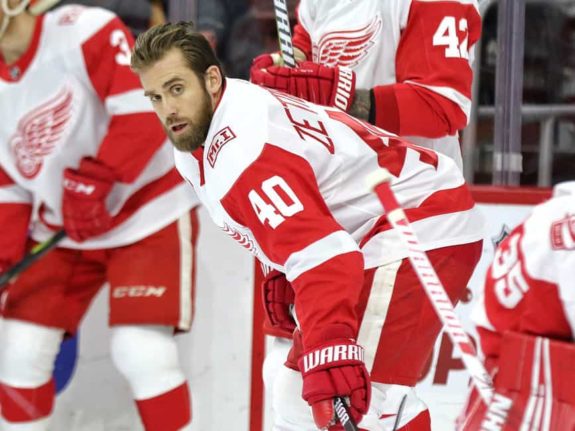Winning back-to-back championships is one of the hardest things to do in sports, and in the NHL, it is no different. After winning the Stanley Cup in the 2001-02 season, the Detroit Red Wings were looking to do so with the majority of their championship team still intact.
After the 2001-02 season, the Red Wings suffered two major blows when head coach Scotty Bowman and goaltender Dominik Hasek both decided to retire. This led the team to promote long-time assistant coach Dave Lewis to head coach and go out and sign veteran goalie Curtis Joseph in free agency. Captain Steve Yzerman also had to undergo a knee re-alignment surgery in the offseason, which led to him missing the first 61 games of the 2002-03 season.
Even with the two key losses in the offseason, Detroit was still viewed as one of the favorites to win the Stanley Cup and become the first team to repeat since they did it in 1997 and 1998. This was largely due to the fact that they had many of their key contributors returning, including eight future hall-of-famers (Brett Hull, Nick Lidstrom, Sergei Fedorov, Steve Yzerman, Luc Robitaille, Igor Larionov, Chris Chelios and Brendan Shanahan). Mixed in with these season veterans, the Red Wings also had two young stars in the making in Henrik Zetterberg and Pavel Datsyuk.
Successful Regular Season for Detroit
While missing their captain, the Red Wings relied heavily on their other veteran players throughout the 2002-03 season, specifically Brett Hull and Sergei Fedorov, for their offense. This led to the then-38-year-old Hull tallying 37 goals and 39 assists for a total of 76 points, while Fedorov put up 36 goals, 47 assists and 83 total points during the regular season.
Mixed in with solid seasons from Brendan Shanahan (30 goals, 38 assists, 68 points) and defenseman Nick Lidstrom (18 goals, 44 assists, 62 points), the veterans led the way for the Detroit offense. Lidstrom would go on to win the Norris Trophy in 2002-03. But the team’s young guns were also a vital part of the offense, with Zetterberg tallying 22 goals, 22 assists and 44 points as a rookie (placed second in Calder Trophy voting) and Datsyuk tallying 12 goals, 39 assists and 51 points in his second season in the NHL.

This all led to the Red Wings leading the entire NHL in goals scored with 269 and having the best power play in the league at 23.8 percent.
In net, Curtis Joseph was able to hold steady throughout the season, going 34-19-6 with a 2.49 goals-against average and a .912 save percentage. Mixed in with solid defense, which was bolstered at the trade deadline with the acquisition of Mathieu Schneider, led the Red Wings to allow only 203 goals on the season.
Related: Hockey Hall of Fame Debates: Curtis Joseph
By the end of the regular season, Detroit sat at the top of the Central Division and earned the second seed in the Western Conference after finishing at 48-20-10-4 with 110 points on the year. This record also earned them the third-best record in the NHL (behind the Ottawa Senators and Dallas Stars) and the second-best home record behind Dallas at 28-6-5-2. The Red Wings had been able to live up to the hype and the battle of repeating as champions it seemed.
Failed Postseason in Detroit
After the impressive regular season, fans in Detroit were fully expecting a deep playoff run and another return to the Stanley Cup Final, but that never materialized.
Once the postseason hit, the Red Wings’ offense seemed to disappear against the seventh-seeded Mighty Ducks of Anaheim. In the first-round matchup against the Mighty Ducks, the Red Wings were outscored 10-6 and were swept in four games to the eventual Stanley Cup runner-up.
Anaheim goaltender Jean-Sebastian Giguere outplayed the veteran Joseph, posting 63 saves in a three-overtime Game 1 and then saved 36 in Game 3 of the series. Joseph was able to finish the series with only a 2.08 goals-against average and a .917 save percentage while still losing all four games of the series.
At the time, the Red Wings were the first reigning champions to get swept in four games since the 1952 Toronto Maple Leafs. This season led to a ripple effect of moves in the offseason. Fedorov, who played had played his entire 13-year career with Detroit, left as a free agent to play for the Ducks. Along with Fedorov, Igor Larionov left Detroit to play in New Jersey, and Robitaille left to play in Los Angeles for the Kings. It took the Red Wings another four seasons to finally return to the Stanley Cup Final when they were finally able to win another Cup against the Pittsburgh Penguins in the 2007-08 season.
